ISRAEL
History

History
Cities in ISRAEL
| Eilat | Jerusalem |
History
Antiquity
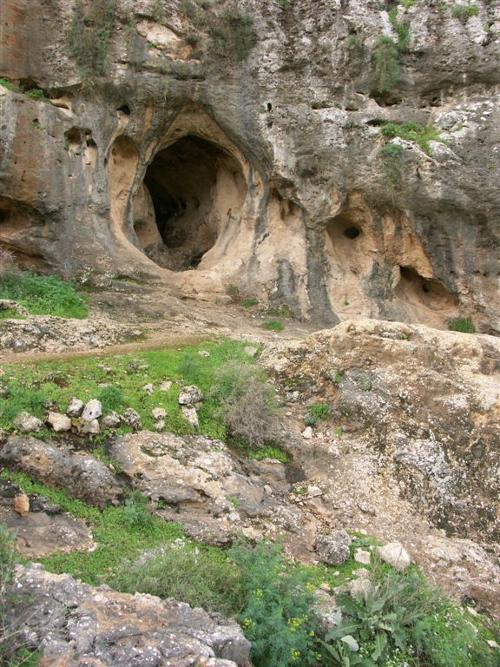 Es Skhul cave where bones have been found in IsraelPhoto: R Yusherun CC 3.0 Unported no changes made
Es Skhul cave where bones have been found in IsraelPhoto: R Yusherun CC 3.0 Unported no changes made
Palestine is at the origin of the small Jewish people. Bone finds date back to 10,000 years BC. and the history of Israel began c. 3000 BC. The land lay between powerful empires such as Babylonia and Egypt, and important caravan roads ran through this area. In addition, it was a fertile arable land. Towards the end of the third millennium BC. the first political units arose; the Canaanites founded cities like Jericho, Megiddo, and Jerusalem.
Egypt
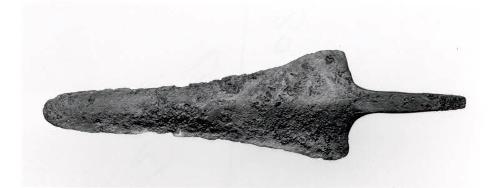 Hyksos Spearhead. IsraelPhoto: Public domain
Hyksos Spearhead. IsraelPhoto: Public domain
Even then, the history of Palestine was strongly linked to the developments in Egypt, who where about 1700 BC. conquered by the Hyksos. Only after 1550 BC. the Hyksos were again driven from Egypt and the country soon became the largest power in the Middle East. It was not long before Palestine became subject to Egypt, and the city kings appointed by the Egyptians were responsible for paying taxes to the Egyptian pharaohs. The vast majority of the population suffered greatly from the collection of taxes, often with the help of soldiers.
Philistines and Hebrews
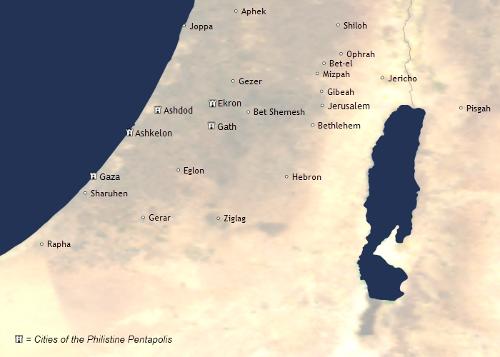 Israel Five-City LeaguePhoto: Public domain
Israel Five-City LeaguePhoto: Public domain
Early 13th century BC. the Philistines, a so-called sea people, invaded Palestine and succeeded the Egyptians despite fierce opposition. The Philistines ruled through the so-called "League of Five Cities," which consisted of the cities of Gaza, Ashkelon, Ashdod, Ekron, and Gath. In the absence of central authority, the Philistines could not properly defend Palestine against attacks from such tribes as the Edomites, the Ammonites, the Moabites, and especially the Hebrews, a nomadic pastoralist people. They emerged as the strongest from the infighting and founded several settlements, for the time being only in mountainous areas.
The native population of Palestine initially had little to fear from the Hebrews and were left alone. After permanent settlement in the mountains, the Hebrews moved into the valleys where the cities of Canaanites were. The fact that the militarily weaker Hebrews were able to conquer these cities fairly easily was partly due to the mutual struggle between the different cities, which weakened themselves. Furthermore, they waged war in a clever way and made use of spies, saboteurs and traitors, in short they had organized themselves perfectly and made good use of the weaknesses of the opponents.
It was now a matter for the Hebrews to consolidate the situation and, in their opinion, required strong central authority. It was considered time to establish a royal family. Throughout his reign Saul fought against the Philistines, as well as Edomites, Moabites, and Amalekites. During that time, Saul was able to unite the Israeli tribes and implement significant social changes. One of those new aspects was the imposition of some sort of tax, which, however, provoked widespread backlash. The last years of Saul's reign were marked by major conflicts with the traditional elite.
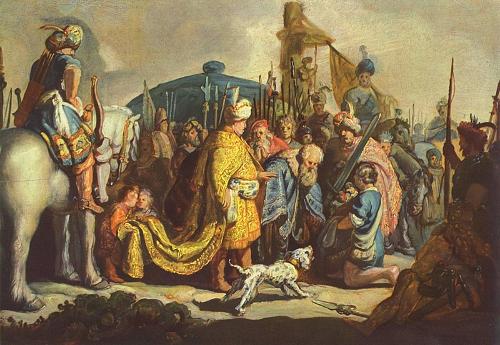 Israel, David with Goliath's Head for Saul, painting by RembrandtPhoto: Public domain
Israel, David with Goliath's Head for Saul, painting by RembrandtPhoto: Public domain
After Saul was overthrown by David with the help of the Philistines, David took over the leadership of the Israeli people. First the southern tribes in Judah apointed him as king, in 1004 BC the northern tribes followed suit. The Philistines tried to break this covenant, but were defeated and then played no role in Israel's history. After this David tried to conquer Jerusalem; this succeeded and Jerusalem became the capital and the religious center of the kingdom. Domestically, David had the same problems as Saul. Protests and uprisings, led by his son Absalom among others, were crushed by David. In 965 BC. David was succeeded by his son Solomon who immediately eliminated all his competitors, but further ensured that the kingdom became relatively quiet. After Solomon's death, his eldest son Rehoboam succeeded him.
The northern tribes of Israel realized that under the new ruler they would have an even more difficult time than under his father. They then called Jeroboam back from Egypt and crowned him king of the northern states, creating a tense situation. Jeroboam, however, managed to keep his country out of war, but three of his successors were murdered, including his son Nadab. About this time the southern land of Judah and northern Israel were under threat from the Assyrians. Judah and Israel made peace to resist the Assyrians, who were devastatedly defeated in 853 BC. Not until 841 BC. Assyrian King Shalmaneser managed to subdue Israel. A hundred years later, the entire upper class of the Israelites were taken into slavery by the Assyrian king Sargon, and Israel temporarily disappeared from the map. Southern Judah was founded in 734 BC. conquered by the Assyrian Tiglath-Pileser. Judah accepted the rule and faithfully paid her taxes, leaving the people alone for a long time by the Asssyrians. Early eighth century BC. Palestine became a vassal state of Egypt and later the Egyptians were again expelled by the Babylonian prince Nebuchadnezzar. When Zedekiah (597-587 BCE) declared independence, Nebuchadnezzar became very harsh and plundered in 587 BCE. Jerusalem and destroyed Solomon's temple. After Nebuchadnezzar II's death in 562 BC. the Persians, led by Cyrus, managed to survive in 539 BC. Conquer Judea. Many rich Jews from Persia then returned to Judea.
Seleucids
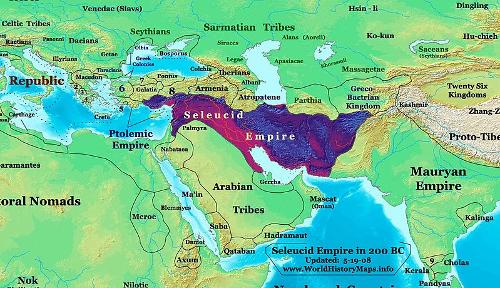 Empire of the Seleucids 200 BC, IsraelPhoto: Thomas Lessman CC 3.0 Unported no changes made
Empire of the Seleucids 200 BC, IsraelPhoto: Thomas Lessman CC 3.0 Unported no changes made
After Alexander the Great's death in 323 BC. his vast empire was divided among his successors, the so-called Diadochi. Ptolemy was assigned Egypt and conquered in 320 BC. also Palestine. A hundred years later, the Seleucids invaded Palestine under the leadership of Antiochus III, and from 200 BC. the Jews were part of the Seleucid empire and the Hellenization of the country could be accelerated.
The Hellenes oppressed the Jews and of course a revolt was bound to happen.
The high priest Mattatias, who had fled to the desert, gathered a large number of militant supporters and this group named itself after one of Mattatias's forefathers, Hasmon. After the death of Mattatias, his sons Judas, Jonathan, and Simeon took over the leadership of the revolt of the Hashmoneans. Judas in particular, nicknamed the Maccabee, proved himself an excellent soldier and conquered in 164 BC. Jerusalem on the Seleucids. The Seleucids now formed a large army and tried to regain the lost ground, offering the Hasmoneans peace and freedom of religion. Judas fought on, but was killed in 160 BC. His brother Jonathan succeeded him, but for political motives he was removed in 143 BC. murdered.
After this, the third brother, Simeon, took over and managed to close a truce with the Seleucids. In return he was appointed high priest and became leader of the Jews with a reasonable degree of independence. In 140 BC. The heredity of this office was officially confirmed and the Hasmonean dynasty was finally established and the land was renamed Israel. In 134 BC. Simeon was killed by a relative, but his son, John Hyrcanus I, managed to put down the rebellion and ascend the throne himself. The Seleucids started another war but it came to nothing, on the contrary, Israel slowly but surely expanded its sphere of influence.
After the death of John, a bloody family struggle for the succession ensued and Alexander Jannai, a son of John, eventually came to power. Under his rule, the coastal cities of Galilee were conquered, as well as areas east of the Jordan.
Romans
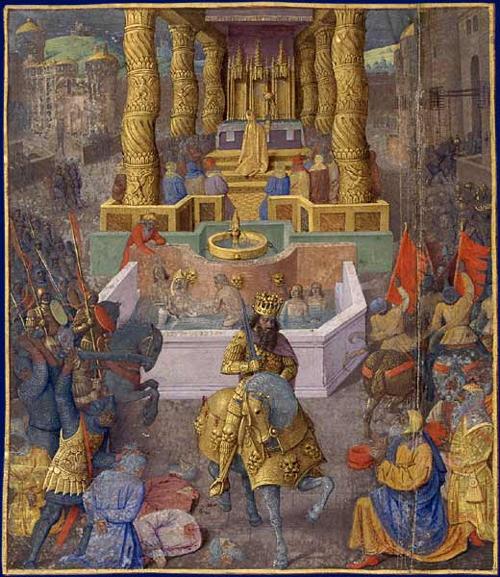 Entry into Jerusalem, Israel by Herod the GreatPhoto: Publc domain
Entry into Jerusalem, Israel by Herod the GreatPhoto: Publc domain
After Alexander's death, another succession battle ensued, from which the Romans took advantage. After the collapse of the Seleucid Empire, they had become the great power in this region, making Syria and Palestine the Roman province of Syria. After the death of the mighty Emperor Caesar in 47 BC. the area fell into civil war and was also attacked from the east by the Parthians.
His son Herod was proclaimed king of Palestine, he knew in 37 BC. to reclaim his empire and Jerusalem. Most of the members of the Supreme Council of the Israelites, the Sanhedrin, were executed by him. Herod ensured a long period of peace with foreign countries, but was a very harsh man to his subjects, who hated him. This made him increasingly suspicious and madness struck when he even had members of his own family murdered. When Herod in 4 BC. finally died at the age of 69, a sigh of relief went through Israel.
Three of his sons reigned until 44 AD. over his empire, after which the country was further ruled by Roman procurators, who, however, were more interested in enriching themselves, which made corruption rampant. In May 66 a revolt broke out and the Jews managed to drive the Romans out of several cities. In the summer of 67, the Romans re-entered the country, Flavius Vespasianus from the north and his son Titus from the south. Just before Vespasian took Jerusalem, word reached him that Emperor Nero had been overthrown and Vespasian was proclaimed emperor.
In 70 Titus finally managed to conquer Jerusalem. In 132, led by Simeon Bar Kokhba, a revolt against the Romans ensued and the Jews rapidly conquered the entire country. Only the regent in Britain, Julius Serverus, managed to stop the advance of the Jews by paying them back with equal coin. The decisive battle was won by him in 135, and 600,000 were counted among the Jews, as well as thousands of Roman soldiers.
Byzantine and Arab Empire
In 324 the Christian Constantine became the sole ruler of the Roman Empire and built churches wherever Jesus had been. One of his successors, Emperor Justinian (527-565), also followed this policy and many pilgrims brought prosperity to the country. In 529 the Samaritans revolted and in 614 the Persians marched through Palestine.
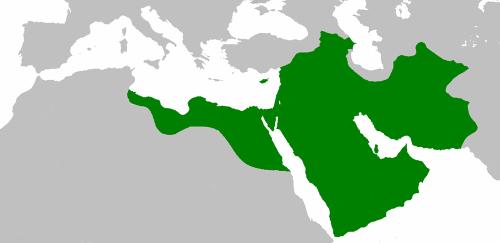 Caliphate around 654Photo: Mohammad adil at the English-language Wikipedia CC 3.0 no changes made
Caliphate around 654Photo: Mohammad adil at the English-language Wikipedia CC 3.0 no changes made
Between 634 and 644, the entire Middle East, including Palestine, was conquered by Caliph Omar I. However, the Palestinians did not suffer much because Islam was a tolerant religion. From 750 onwards, the Abbasids ruled Palestine from Baghdad for five hundred years. Jerusalem grew into the second most important city for Muslims at that time. From 905 the Abyssids were threatened by the Fatamids and the Byzantines. Churches and monasteries were burned to the ground by Sultan Hakim of the Fatamids. Hakim was murdered in 1021, followed by a short period of rest. Around 1070, Palestine was conquered by the Turks.
Crusades
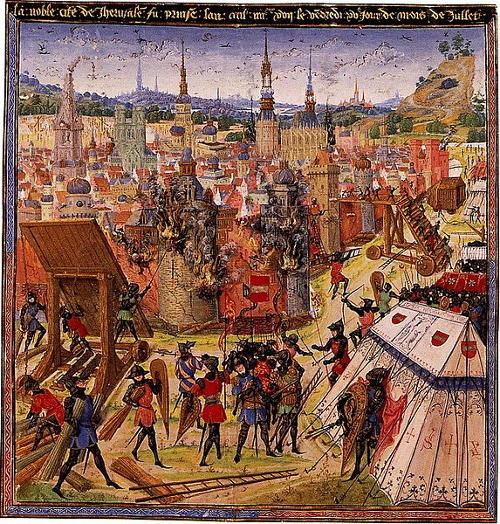 Conquest of Jerusalem, Israel in 1099Photo: Public domain
Conquest of Jerusalem, Israel in 1099Photo: Public domain
On November 27, 1095, the then Pope Urban called for a crusade to liberate the holy sites in Palestine from the "unbelieving" Muslims. Ultimately, the period of the Crusades would last more than two centuries and cost millions of lives. In July 1099, Jerusalem was conquered with unprecedented killings of Muslims as well as Jews, men and women, children and the elderly. Big names associated with the Crusades were Robert Curthose, Raymond of Toulouse, Bohemond of Taranto and Godefroid of Bouillon. The latter died in 1100 and his brother Baudouin was crowned king of Jerusalem. Baudouin died in 1118 and was succeeded by a relative, Baudouin II, under whose reign the monastic orders of the Knights Templar and the St Johns were established.
The Muslims further intensified the fight against the Christians and even Baudouin was imprisoned. After paying the ransom, they released him, but in 1131 he died and was succeeded by his son-in-law Fulk of Anjou. In 1144 Jerusalem was conquered by the Saracens and again the Pope called for a crusade against the Muslims. However, this crusade, led by King Louis VII of France and Emperor of Germany Conrad III, failed completely, and the Muslim states in the Middle East grew stronger and stronger. Saladin, Sultan of Egypt at that time, conquered practically all the Crusader fortresses and cities in 1187 and Jerusalem was taken on October 2, 1187.
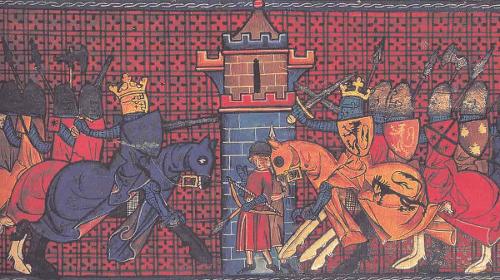 Richard Lionheart on a crusade, IsraelPhoto: Public domain
Richard Lionheart on a crusade, IsraelPhoto: Public domain
Another crusade was held, this time led by Richard the Lionheart of England, Philip August of France and Frederick Barbarossa of Germany. Despite the death of Frederick Barbarossa, the other two marched to the Holy Land and had some initial success. Richard the Lionheart even managed to wreck Saladin's army and then wanted to conquer Jerusalem again. Before that, Saladin proposed a peace treaty and free access to all sacred sites. Richard agreed in 1192 and returned to England. Four more Crusades followed, but in 1244 the kingdom of Jerusalem was finally conquered by the Muslims. In 1271 the last Christians left Palestine, only the city of Acre was occupied until 1291.
Turkish rule and British are given mandate over Palestine
After the Crusades, Palestine belonged to the empire of the Mamluks, who ruled the empire from Cairo. The Mamluks were defeated at Aleppo by the Ottoman Sultan Selim in 1516, beginning the 400-year rule of the Turks in the Middle East. Palestine no longer played any role on the international stage for a long time, and only came back into the picture at the time of the French emperor Napoleon Bonaparte. However, with the support of the British, Napoleon could be kept out of Palestine. In 1874, the Jews established the Palestine Exploration Fund, followed in 1878 by the foundation of the first agricultural settlement. Four years later, the first wave of immigration started from Eastern Europe. In 1896, Theodor Herzl wrote the book "The Jewish State", which advocated the establishment of a Jewish state in Palestine. Herzl would thus become the founder of Zionism, the Jewish national movement whose goal is the return of the Jewish people to the Holy Land (in fact the hill of Zion).
In 1901, Chaim Weizmann founded the Jewish National Fund, which spent money on land purchases. Between 1904 and 1914, many immigrants returned to Palestine, and the Palestinians gradually grew suspicious as more and more land fell into the hands of the Jews and the establishment of a Jewish state seemed to be drawing ever closer. In 1908, Arabs attacked Jewish villages for the first time. In November 1917, the Balfour Declaration followed, in which Britain declared that it supported the formation of a Jewish state in Palestine. Some time earlier France had indicated that it was sympathetic to these developments.
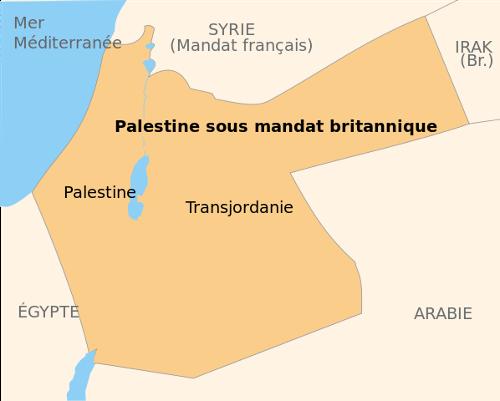 Map of Palestine and Transjordan during the British MandatePhoto: Public domain
Map of Palestine and Transjordan during the British MandatePhoto: Public domain
In April 1920 the British were given the mandate over Palestine and the country was again inundated with immigrants. Then the Grand Mufti of Jerusalem called for a holy war against the Jews and disturbances were the order of the day. The British were now much more cautious, fearful as they were to risk the alliance of the Arabs. This put an end to the Jews' dream for a state of their own for the time being, because to achieve this on your own was of course an illusion. Nevertheless, the Jews internally worked further and further towards a Jewish state, but the Arabs also increasingly acquired a national consciousness. This deepened the gap between the Jews and the Arabs and the number of violent clashes between the two peoples increased. The British, who still held the area under mandate, increasingly sided with the Arabs and turned the thumbscrews on the Jews.
WWII
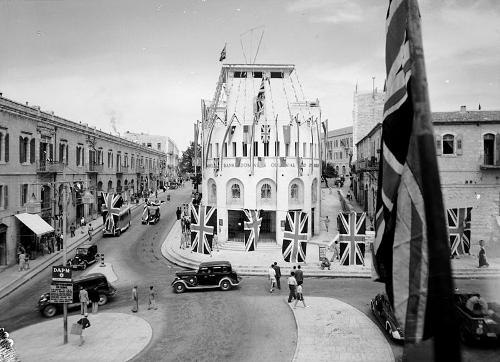 Jeruzalem 8 mei 1945Photo: Matson Photo service in the public domain
Jeruzalem 8 mei 1945Photo: Matson Photo service in the public domain
In 1933, power in Germany was taken over by the Nazis, and that was the signal for tens of thousands of Jews to immigrate to Palestine. This again caused a lot of trouble with the Arabs and just before the start of World War II the Britttsh announced a stop of immigration, despite the knowledge that the Jews were having a very difficult time in Germany. Yet many Jews still entered the country in secret and there was increasing resistance against both the British Mandate troops and the Arabs. In the meantime, World War II was raging in Europe and practically all of European Jewry was massacred by Adolf Hitler's Nazis. Approx. 6 million Jews were systematically murdered in concentration camps, most of them in gas chambers. A relatively small group managed to get out of the clutches of the Nazis, especially in countries such as Finland, Denmark, Italy and Bulgaria.
During the war, the British came under increasing attack in Palestine. Secret organizations attacked British targets and murdered British policemen and soldiers. On February 14, 1947, the British declared that they were no longer in control of the Arab-Jewish problem and enlisted the help of the United Nations. On November 29, 1947, the United Nations General Assembly approved the division of Palestine into a Jewish and an Arab state. Many Arabs were against this partition plan, and the Mufti of Jerusalem even called for all-out war on the Jewish state.
The State of Israel
Immediately a civil war broke out between Arabs and Jews, with the Jews beginning to gain the upper hand. Impressed by the bloody conflict and opposition from Britain, the United Nations wanted to undo the partition decision, but the now-formed Provisional Administration of the Jewish Community, which numbered 600,000 souls, proclaimed the Jewish State of Israel on May 14, 1948 the 26-year-old British Mandate on Palestine came to an end.
In response, barely hours later, tanks from Egypt, Transjordan, Syria, Lebanon, and Iraq rolled toward Israel; the War of Independence had begun. Although another US mediation plan was launched, Israel went to war against the enemy. With a one-month hiatus, fighting continued until early 1949, when ceasefire treaties were negotiated by the UN on the island of Rhodes, with Egypt, Lebanon, Jordan and Syria. However, through extensive arms supplies, Israel had built up such a predominance that even areas were conquered that are still Israeli territory today. Arab Palestinians fled in their thousands to neighboring countries and by early 1949, 80% had left the country or had been expelled by Israeli forces. They were forced to settle in refugee camps in Jordan (including the West Bank before 1967), Lebanon and the Gaza Strip that was annexed by Egypt. Jews from all over the world made just the opposite journey; especially from the Soviet Union and Arab countries, hundreds of thousands of Jews emigrated to Israel to help rebuild the country. Terrorists ("fedajin") were deployed from neighboring Arab countries to disrupt life in Israel. This cost the lives of approximately 1,300 Israelis and Israel responded with retaliation each time. This pattern would be the fate of the Israeli and Palestinian people to this day.
Israel's first prime minister and for many years the dominant figure was David Ben-Gurion (1948-1953; 1955-1963). He was the leader of the largest party, the socialist Mapai. State formation began under Ben-Gurion. Industrialization and mechanization of agriculture resulted in a welfare state following a Western example.
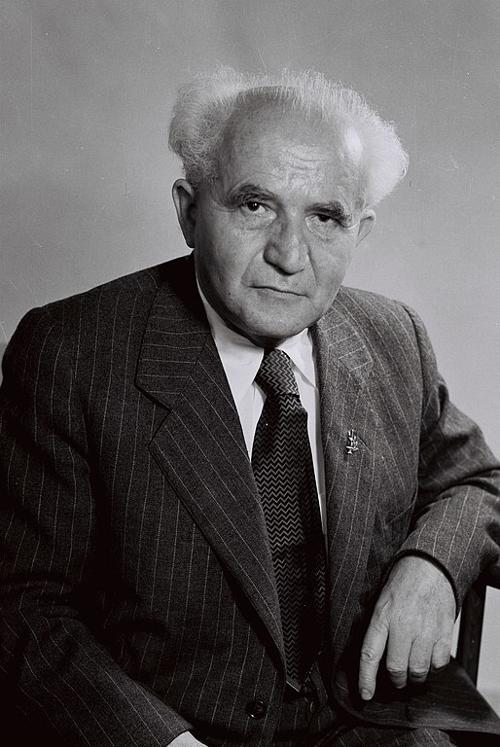 David Ben Gurion, Israel's first Prime MinisterPhoto: Israeli GPO photographer CC 4.0 International no changes made
David Ben Gurion, Israel's first Prime MinisterPhoto: Israeli GPO photographer CC 4.0 International no changes made
The main problem for Israel remained its relationship with the Arab states. Especially after the revolution in Egypt (1952) the situation began to become threatening, as Egyptian President Nasser strove to undo the defeat of 1948. In 1955, tensions increased further due to, among other things, arms supplies to Egypt from communist countries, the military alliances between Egypt and Arab countries and the closing of the Suez Canal in 1956. Israel was incited by France and Great Britain to start a war against Egypt . Sinai was incorporated in six days, but pressure from the United States forced Israel not to take it permanently. In March 1957, Israel withdrew its troops. The situation in the region now became very complicated and also the scene of the Cold War, in which the Arab states were supported by the Soviet Union and Israel by the United States and Western European countries.
In 1960 Prime Minister Ben-Gurion came into conflict with many party members, which led to his resignation in 1963. He was succeeded by the Finance Minister Levi Esjkol (1963-1969).
The Palestine Liberation Organization (PLO) was founded in 1964. They reminded the world community of the great Palestinian refugee problem, but Israel simply couldn't be relented to allow refugees to return to their old homeland. On the other hand, the many refugees in the countries where they stayed were an increasing source of problems.
Six-Day War and Yom Kippur War
 Moshe Dayan, IsraelPhoto: IDF Spokesperson's Unit CC 3.0 Unported no changes made
Moshe Dayan, IsraelPhoto: IDF Spokesperson's Unit CC 3.0 Unported no changes made
In the summer of 1967, Israel waged a pre-emptive war against neighboring Arab countries and occupied the Syrian Golan Heights, the Jordanian West Bank, Egypt's Sinai Peninsula with the Gaza Strip during the so-called Six-Day War (June 5-10, also known as the June War). and East Jerusalem. Led by the legendary Moshe Dayan, the Israelis won a resounding victory over Arab neighbors. On June 10, 1967, through the Security Council, the firing was stopped, ending the Six Day War.
On November 22, 1967, the Security Council passed Resolution No. 242 on the basis of Israel's withdrawal from the occupied territories, but Israel refused to withdraw from the occupied territories and installed a military administration. The Arab states refused to recognize Israel and after 1967 Israel was ravaged by Palestinian terrorists operating from Jordan and Lebanon. Retaliatory acts were also carried out on Egyptian territory, after which Egypt made proposals for peace negotiations, which, however, were rejected by Israel. In October 1973 Egypt and Syria took to the attack and initially achieved success in this so-called Yom Kippur war. Israel, however, retaliated and the United States and the Soviet Union arranged for an armistice. Diplomatic negotiations between Egyptian President Anwar as-Sadat, US mediator Henry Kissinger and Israeli Prime Minister Golda Meir (who had succeeded the late Eshkol in February 1969) were conducted in such a way that Egypt appeared to have emerged victorious. In March 1974, Ms. Golda Meir formed a new coalition government; in April, however, she announced her resignation. General Rabin became prime minister of a new coalition cabinet with, among others, Shimon Peres and Jigal Allon.
Peace Treaty between Israel and the Palestinians!
In the course of 1974, separation agreements were concluded with Egypt and Syria, whereby Israel withdrew from the territories it had occupied in the October war and also gave up part of Sinai.
In the meantime, Israel became increasingly isolated, especially through the use of the 'oil weapon' by the Arab countries, and was also involved in the Lebanese civil war because of the retaliatory and preventive actions on Lebanese soil against the Palestinians residing there.
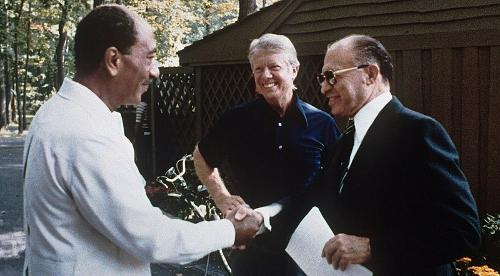 Camp David agreementPhoto: Public domain
Camp David agreementPhoto: Public domain
In 1977, parliamentary elections were won by the conservative Likud party under Menachem Begin. The war meanwhile resulted in an economic crisis, which even led to emigration. In municipal elections in 1976, the Palestinian population voted en masse for the PLO, while the Israeli Palestinians increasingly declared their solidarity with the Palestinians in the occupied territories. In November 1977, President Sadat of Egypt visited Begin and proposed a peace settlement. In 1978, under the mediation of US President Carter at Camp David, prospects of a peace treaty between Israel and Egypt emerged. This peace treaty was actually concluded in March 1979, but the continued establishment of settlements in the occupied areas prevented further rapprochement. In August 1980, the Israeli parliament passed a law declaring Jerusalem the one and indivisible capital. The elections of June 30, 1981 were won by the Likud bloc, and its second cabinet could begin. In 1981, settlement policy was also intensified and on December 14 the Golan Heights was annexed, despite much international criticism.
Despite a tacit truce with the PLO in Lebanon, after an attack on the Israeli ambassador in London on June 6, 1982, Israeli forces entered southern Lebanon with great displays of power and even besieged the capital Beirut. Despite the retreat of the PLO fighters, Israel also faced a lot of domestic criticism, especially after the massacres by Lebanese allies in the Palestinian camps Sabra and Chatila in September 1982.
In August 1983, Prime Minister Begin resigned and his Foreign Minister Yitzchak Shamir took over the leadership of the cabinet. Early elections in March 1984 resulted in a government of 'national unity', in which first the socialist Shimon Peres (1984-1986) and then Likud leader Shamir (1986-1988) would be prime minister. In June 1985, this government decided, apart from the security zone, a complete withdrawal from Lebanon. This cabinet managed to improve the miserable economic situation with a profound restructuring policy.
In 1984, 10,000 Jews or Falashas from Ethiopia came to Israel via a secret airlift.
First Intifada
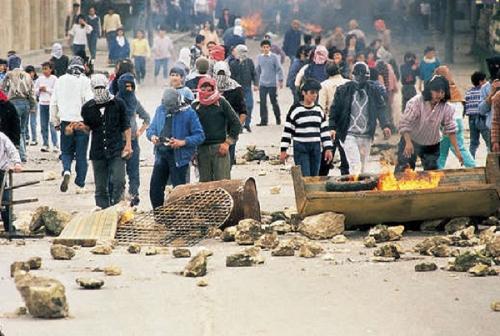 Barricade during the first intifada, IsraelPhoto: Abarrategi CC 4.0 International no changes made
Barricade during the first intifada, IsraelPhoto: Abarrategi CC 4.0 International no changes made
Growing unrest in the occupied territories was answered by Israel with harsh punishment, deportations, bans on appearance and school closures. In addition to PLO supporters, more and more Islamic fundamentalists, including the Hamas movement, also manifested themselves. On December 8, 1987, the Palestinian uprising or Intifada broke out in the Gaza Strip and the West Bank. Despite tough measures, the military proved unable to cope with this and growing disunity within Israel itself was reflected in the November 1, 1988 elections, in which both the Likud bloc and the Workers' Party lost seats to radical right and left parties.
Meanwhile close strategic, political and economic cooperation with the United States continued, but ties were also gradually re-established with the Soviet Union and other communist countries in Eastern Europe in the 1980s, which was reflected in, among other things, an increasing immigration of Russian Jews.
Second Gulf War
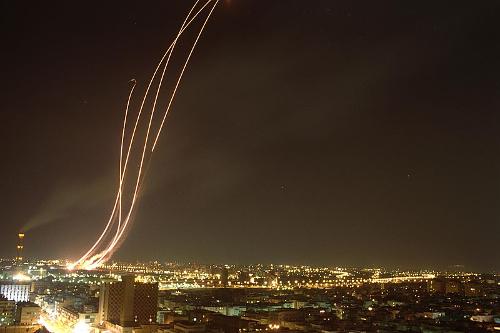 Israel fires Patriot missiles to take out Iraqi Scud missilesPhoto: Alpert Nathan CC 3.0 Unported no changes made
Israel fires Patriot missiles to take out Iraqi Scud missilesPhoto: Alpert Nathan CC 3.0 Unported no changes made
At the end of 1989, Egypt under Mubarak and the United States made unsuccessful attempts to break the deadlock in talks over the occupied territories. On March 15, 1990, the Shamir-Peres cabinet fell and it was only after a difficult cabinet formation that Shamir finally managed to form a coalition of his Likud block with a number of religious and nationalist parties in June 1990.
After the start of the Second Gulf War on January 17, 1991, Iraq attempted to bring Israel into the battle by bombarding Israeli cities with Scud missiles, causing some deaths, but mostly material damage. Under pressure from the US government, Israel decided not to respond to the attacks in order not to endanger the anti-Iraqi coalition.
After the war, in February 1991, the Intifada flared up again. Partly under pressure from the Americans, Israel took part in a peace conference on the Middle East in Madrid at the end of 1991. The Palestinians who were part of the Palestinian-Jordanian delegation were given a hero's reception upon their return.
Period Rabin
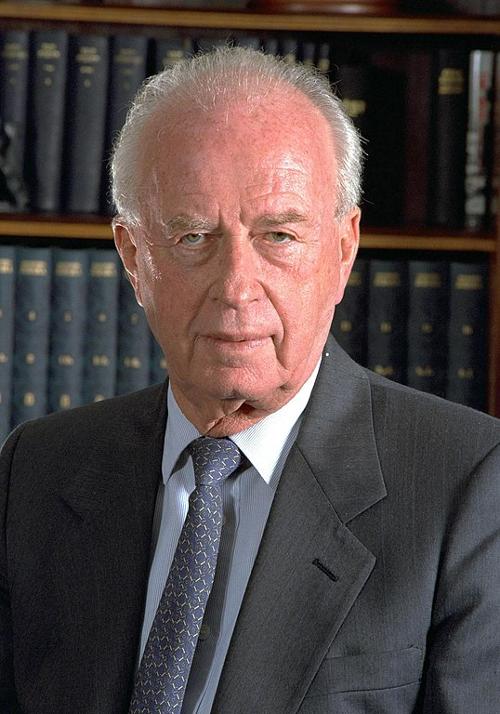 Rabin, IsraelPhoto: Yaakov Saar CC 3.0 Unported no changes made
Rabin, IsraelPhoto: Yaakov Saar CC 3.0 Unported no changes made
On July 13, 1992, Shamir was replaced by Yitzchak Rabin. The Rabin administration did not shy away from contacts with the PLO, which resulted in an agreement in Washington on September 13, 1993 on limited Palestinian self-government in Gaza and Jericho. This Oslo Accord opened up opportunities for improving relations with Syria, Jordan and Lebanon. The Oslo-2 accord followed in 1995, which provided for a phased Israeli withdrawal from the main cities of the West Bank.
In March 1993, the Workers' Party Knesset elected Ezer Weizman president to succeed Chaim Herzog. In mid-1994, Israeli Prime Minister Rabin and King Hussein of Jordan signed the "Washington Declaration," formally ending the state of war between the two countries. Negotiations with Syria, on the other hand, continued to be difficult, with the main stumbling blocks being the security measures in an Israeli withdrawal from the Golan Heights and the 'depth' of the peace to be made. In 1995 clashes between the Israeli army and its ally, the South Lebanese Army (SLA), on the one hand, and Shia Hezbollah fighters and Palestinians on the other, were again killed dozens of dozen.
Period Netanyahu
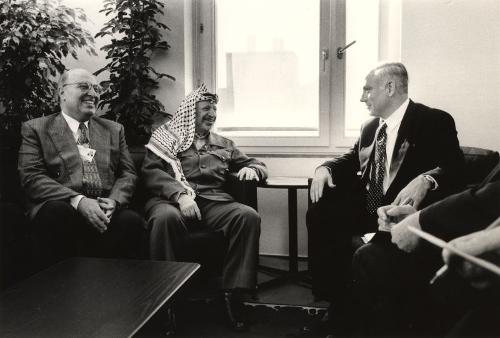 Netanyahu meets Arafat at the World Economic Forum in Davos in 1997Photo: World Economic Forum CC 2.0 Generic no changes made
Netanyahu meets Arafat at the World Economic Forum in Davos in 1997Photo: World Economic Forum CC 2.0 Generic no changes made
In November 1995, Prime Minister Rabin was murdered in Tel Aviv by a young Israeli nationalist. He was succeeded by Shimon Peres, who continued the peace process. Peres suffered a very minor defeat against Likud leader Benjamin Netanyahu in the parliamentary election in late May 1996 and in the first direct election of a new prime minister. Netanyahu formed a right-wing coalition government and pledged to continue the peace process with the PLO and the Arab countries. In the 1996 elections for a Palestinian Council and a Palestinian president, Arafat was elected president by a large majority.
During 1996, great political division arose in Israel over the peace process. The reasons for this were Hamas's suicide bombings and Netanyahu's policies, which overruled Rabin and Peres' peace-for-land philosophy and reluctantly continued negotiations with the PLO under great foreign pressure on the basis of a peace-for-security strategy.
Netanyahu announced the construction of new Jewish settlements and initially refused to agree to the Israeli military's withdrawal from Hebron, which was agreed upon in early 1997 following US pressure. Tensions between Israel and the PLO quickly escalated and the fragile relationship with the Arab countries was also tested by Israel's tough stance.
The peace process was further compromised when, in February 1997, Netanyahu announced the construction of the Har Homa Jewish residential area in East Jerusalem. In addition, in September of that year, the construction of new Jewish settlements began in Efrat, in the West Bank. Even the United States openly disapproved of the Netanyahu government's policies in October 1997, and dissatisfaction with Israeli settlement policies grew within the Arab world and the European Union. In November, talks resumed between Israel and Palestinian delegations on the further elaboration of the area transfer. In Israel, Netanyahu was hit hard by, among other things, an accusation of corruption and a failed assassination attempt on a Hamas leader by Israeli intelligence. Also in Israel itself, resistance grew against the Israeli presence in Lebanon, where the army carried out several attacks on the pro-Iranian Hezbollah. In June 1997, the Workers' Party elected Ehud Barak as party leader, succeeding Shimon Peres. In the Palestinian Autonomous Territories (West Bank and Gaza Strip), the living conditions deteriorated significantly as a result of Israel's punitive measures following the Hamas bombings. 70,000 Palestinians could not go to work because of the border closures. Palestinian leader Arafat also lost prestige due to the deadlock in the peace process and increasing corruption in the Palestinian circle. In April, British Prime Minister Blair made an attempt as President of the European Union to get the peace process back on track.
US pressure on Netanyahu eventually led to the Wye Plantation deal, led by US President Clinton and with the help of the ailing Jordanian King Hussein, was signed in October 1998 by Arafat and Netanyahu. The deal called for Israel to withdraw from 13.1 percent of the West Bank, and Arafat, in turn, pledged to take tougher action against Hamas terrorist attacks and was also ready to revise the Palestinian Charter. Israeli settlement policy was again a bummer and proved to be an obstacle to the implementation of Wye Plantation.
Period Barak
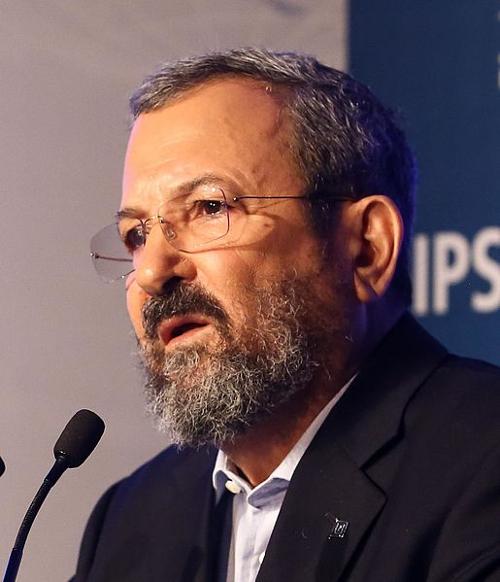 Barak, IsraelPhoto: Adi Cohen Zedek CC 3.0 Unported no changes made
Barak, IsraelPhoto: Adi Cohen Zedek CC 3.0 Unported no changes made
In late 1998, Netanyahu's cabinet fell, but the Likud again elected Netanyahu as prime minister candidate and party leader. In response, several Likud leaders turned their backs on the party. Tensions between ultra-Orthodox and secular Jews in Israel ran high in early 1999.
The big loser of the parliamentary elections in mid-May 1999 was the Likud party; a big winner was the ultra-orthodox Shas party, which won 10 seats. The Workers' Party remained, despite a significant loss of seat. Netanyahu immediately retired as prime minister after the outcome, and the new prime minister became Ehud Barak of the Workers' Party. Netanyahu also stepped down as party leader and was succeeded by Ariel Sharon.
During his campaign, Barak had pledged to revive the peace process with Syria and the Palestinians, and made a concrete commitment that under his rule, the Israeli army would leave Lebanon within one year. Barak further promised that a referendum would be decisive on the return of the Golan to Syria and the withdrawal of the Israeli army from southern Lebanon.
Immediately after his cabinet was sworn in, Barak began negotiations with the Palestinians. After interventions by the United States Secretary of State, Albright, and the Egyptian President, Mubarak, Barak and Arafat closed on Sept. 4. 1999 a new agreement. In this 'Wye-2', Israel committed that 18.1% of occupied land in the West Bank would come under Palestinian control in three stages and that at least 350 Palestinian prisoners would be released. The most important addition in Wye-2 was a blueprint for a comprehensive peace between Israel and the Palestinians, which was to be finalized on February 13, 2000 and form the basis of a final peace settlement by September 2000. After this, Israel began implementing the agreement. 350 Palestinian prisoners were released in two phases and on October 4, 1999 protocols for the Gaza-Hebron link were signed. In January 2000, an agreement was reached between Israel and the Palestinians on the transfer of land in the West Bank.
However, the negotiations for peace went badly, and Jerusalem's status was a particularly sensitive issue. In protest against the ongoing construction of Jewish settlements, the Palestinians stopped negotiations in early December, but a secret summit between Barak and Arafat restarted the stalled peace process.
In December 1999, Israel and Syria agreed on peace negotiations and agreed to return the Golan in exchange for peace, and Israel's withdrawal from southern Lebanon in return for Syrian efforts to curb Hezbollah. In mid-April 2000, Israel completed the withdrawal of troops from Lebanon.
Israel received the Pope in early 2000 and the Chinese President also visited the country.
Period Sharon
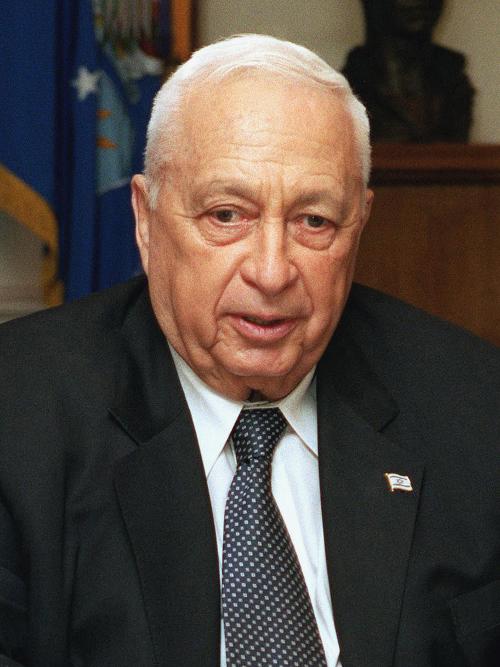 Sharon, IsraelPhoto: Helene C. Stikkel in the public domain
Sharon, IsraelPhoto: Helene C. Stikkel in the public domain
Barak's coalition fell apart in mid-2000 as a result of disagreements between government parties over domestic and foreign policy. New elections took place in February 2001 and resulted in a major victory for Ariel Sharon's Likud party.
As a result of disagreements between Likud and the Workers' Party, elections again took place in January 2003. The Workers' Party lost these elections while the center-right Shinui party grew strongly. By March 2003, Sharon had formed a new cabinet consisting of Likud, Shinui, the National Religious Party, and the National Union, accounting for 68 of the 120 seats in the Knesset.
After the election, Sharon seemed to be heading a somewhat milder course. In early February he even held talks with moderate Palestinians. Meanwhile, the United States, the United Nations, the European Union and Russia put pressure on both sides. A "roadmap" was drawn up for comprehensive peace in the Middle East. In the course of 2003 and early 2004, many bloody attacks ensured that little of all good intentions came to fruition.
After 38 years of occupation, Israel completed the evacuation of its 22 settlements in the Palestinian Gaza Strip on August 22, 2005. Two weeks ahead of schedule and more peacefully than expected, all of the approximately 8,500 settlers left the area.
However, because of the disagreement of the religious parties, Sharon's government fell and Sharon founded his own political party, called Kadima. In 2006, Sharon fell into a deep coma and after a transition period Ehud Olmert became the new prime minister.
Period 2006-present
The 2006 Palestinian Territory elections were won by the fundamentalist-Islamist Hamas. This led to an economic and political boycott of the Palestinian Authority by Israel, the US and the EU, who classify Hamas as a terrorist organization. After an attack by the Lebanese movement Hezbollah on an Israeli border post in which three Israeli soldiers were killed and two captured and rocket fired on Israeli targets, the Israeli army launched a massive retaliatory attack on Lebanon that left over 1,100 Lebanese dead, most of them civilians. In Northern Israel 1,500 katyushar rockets fall; However, Israel saw no opportunity to stop these rocket fire.
 Olmert, IsraelPhoto: Government Press Office (Israel) CC 3.0 no changes made
Olmert, IsraelPhoto: Government Press Office (Israel) CC 3.0 no changes made
The 2006 Israeli-Lebanese war caused major internal problems for Olmert. In southern Israel, too, the population is facing continuous rocket fire, this time from the Gaza Strip controlled by Hamas. Sderot has the hardest to endure here.
In November 2007, a conference was held in the American city of Annapolis between Israel, the Palestinian Authority and several Arab countries that also send representatives. President Bush convened this conference with the aim of creating an independent Palestinian state by the end of 2008.
In May 2008 it was announced that Olmert is suspected of corruption. An American businessman of Jewish descent named Morris Talansky is said to have given him a total of $ 150,000 over a period of 15 years. Olmert claims it was contributions to his election campaigns, but Israeli justice thinks he has pocketed the money. Olmert will step down in July 2008 and will be succeeded by Tzipi Livni. It fails to form a majority government. Meanwhile, Israel is campaigning in the Gaza Strip in connection with continued missile attacks on Israeli territory, sparking international protests for using disproportionate force.
Early elections will be held on February 10, 2009. In the elections, neither party achieves a clear majority. Benjamin Netanyahu is asked to form a new cabinet and succeeds in March 2009 with the support of the Barak Labor Party.
Israeli military forces on May 31, 2010 stopped a shipping convoy of goods en route to Gaza from the waters surrounding Cyprus with the intention of breaking the Gaza blockade and delivering relief supplies and medicines. 9 Turkish activists were killed and relations with Turkey were seriously disrupted. Direct talks with the Palestinians fail in the fall of 2010 due to disagreements over settlement issues. In November 2012, Israel fought a seven-day conflict with HAMAS over the Gaza Strip.
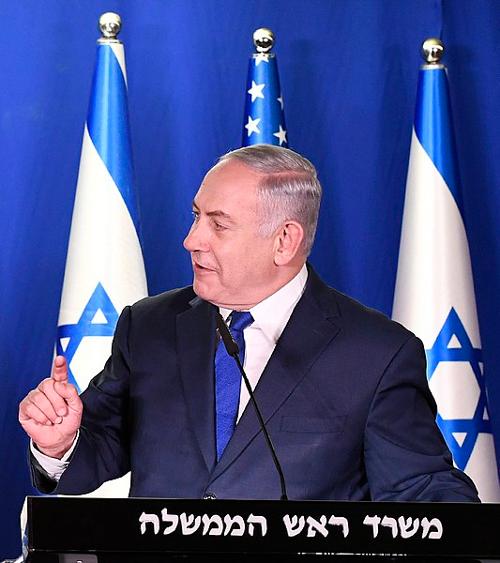 Nethanyahu in 2018, IsraelPhoto: U.S.Embassy Tel Aviv CC 2.0 Generic no changes made
Nethanyahu in 2018, IsraelPhoto: U.S.Embassy Tel Aviv CC 2.0 Generic no changes made
Parliamentary elections will be held in January 2013. Netanyahu takes over as leader of a coalition in March 2013. Direct negotiations with the Palestinians will resume in July 2013 and continue in 2014. In July 2014 reciprocal rocket fire between Hamas from the Gaza Strip and Israel. Israel enters Gaza with ground troops. In May 2015, after early elections, Netanyahu formed his fourth right-wing government with religious input. In May 2016, the coalition will be expanded with Jisrael Beetenoe. In June 2016, an agreement is reached in response to the Gaza shipping incident and Turkey and Israel are normalizing their relations. In February 2017, a law passed in parliament legalizing dozens of Israeli settlements on Palestinian territory. In December 2017, President Trump recognized Jerusalem as the capital of Israel, causing great unrest in the Arab world and among his Western allies. Between March 2019 and April 2020, three elections will take place in which Nethanyahu will take on a center coalition led by Benny Gantz, the former army chief of staff. There will be no clear majority, in April 2020 they will form a government of national unity to face the Covid Pandemic. In early 2021, Nethanyahu is due to appear in court on a charge of corruption.
On the morning of Oct. 7, 2023, Hamas fired thousands of rockets from the Gaza Strip at Israeli towns in the border region and the major cities of Jerusalem and Tel Aviv.
Hundreds of militants breached the border with Israel and committed massacres in the border area, killing at least 1,300 civilians and soldiers. An estimated 200-250 people were captured and taken to Gaza as hostages. Hamas said the attack was in response to the violence of Israeli settlers, the blockade of the Gaza Strip, the desecration of the Al-Aqsa Mosque in Jerusalem and the atrocities committed by Israel against the Palestinian people in recent decades. The attack took place precisely on the Jewish holiday Simchat Torah (Jewish festival celebrating that the Jewish people possess the Torah (the Law) and that it was read on this day of the Jewish year), fifty years and one day after the outbreak of the Yom Kippur War on Oct. 6, 1973, in which Israel was attacked by Syria and Egypt.
The Hamas attack, under the name Al-Aqsa storm, was a coordinated surprise attack by the militant and - according to the European Union, the United States and the United Kingdom, among others - terrorist movement. It was the start of the war between Hamas and Israel that is the continuation of the decades-long conflict between Israel and the Palestinians.
Sources
Cahill, M.J. / Israel
Chelsea House Publishers
Gerhard, C. / Israël
Van Reemst
Griver, S. / Israël : inclusief de Palestijnse Autonome Gebieden
Kosmos-Z&K
Groeneveld, M. / Israël: een leesboek
Boekencentrum
Het Heilig Land
Standaard
Rauch, M. / Israël
ANWB
Sanger, A. / Israël
Van Reemst
Semsek, H.-G. / Israël : Westelijke-Jordaanoever, excursies naar Jordanië
Het Spectrum
CIA - World Factbook
BBC - Country Profiles
Copyright: Team The World of Info